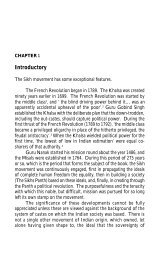Fundamentalism and the Sikh Religious Tradition by T.N. Madan
Fundamentalism and the Sikh Religious Tradition by T.N. Madan
Fundamentalism and the Sikh Religious Tradition by T.N. Madan
Create successful ePaper yourself
Turn your PDF publications into a flip-book with our unique Google optimized e-Paper software.
Government of India <strong>and</strong> in <strong>the</strong> meeting under <strong>the</strong> auspices of <strong>the</strong> Government of India,<br />
<strong>the</strong> water was apportioned........ Rajasthan was allotted 8 MAF out of a total available<br />
quantity of 15.85 MAF.<br />
Two important facts are clear from <strong>the</strong> Narmada Judgement, namely, that<br />
Rajasthan<br />
accepts that it is non-riparian vis-a-vis Ravi <strong>and</strong> Beas, <strong>and</strong> that <strong>the</strong> Centre has been<br />
allocating Punjab waters to Rajasthan, despite objections from <strong>the</strong> former <strong>and</strong> <strong>the</strong>ir<br />
knowledge of <strong>the</strong> verdict that non-riparian Rajasthan has no claim to Punjab waters.<br />
(b) On <strong>the</strong> ground that those who suffer from a stream, are alone entitled to<br />
enjoy rights <strong>the</strong>rein, <strong>the</strong> inhabitants of South California for over a hundred years did not<br />
allow water even to <strong>the</strong> l<strong>and</strong>s <strong>and</strong> parks of <strong>the</strong> Federal Government situated in South<br />
California itself. It was only in February 1988 that <strong>the</strong> lower court agreed that <strong>the</strong> forest<br />
l<strong>and</strong>s of <strong>the</strong> Government in South California should be allowed water, but this permission<br />
was made subject to <strong>the</strong> provision "that state water authorities retain <strong>the</strong> power to<br />
subordinate any new federal claims to <strong>the</strong> needs of <strong>the</strong> current water users in <strong>the</strong> state" It<br />
shows that <strong>the</strong> principle of reciprocity, that benefit should in equity go only to those who<br />
suffer, is so strong that even Federal Forest L<strong>and</strong>s <strong>and</strong> Parks in that very state remained<br />
deprived of <strong>the</strong> facility for over a century, <strong>and</strong> when it was allowed, <strong>the</strong> right was made<br />
clearly subject to <strong>the</strong> interests <strong>and</strong> needs of <strong>the</strong> private users. The decision was<br />
considered destabilising <strong>and</strong> unsatisfactory, <strong>and</strong> <strong>the</strong> affected private parties were going in<br />
an appeal to have it reversed. This shows how strong is <strong>the</strong> recognition <strong>and</strong> sanctity of <strong>the</strong><br />
Riparian Law, <strong>and</strong> its equitable linkage between <strong>the</strong> sufferers <strong>and</strong> <strong>the</strong> beneficiaries.<br />
We record here <strong>the</strong> view of former Chief Justice of India S.M. Sikri about <strong>the</strong><br />
Indus Water treaty : "The fact that <strong>the</strong> Central Government paid to Pakistan a sum of L<br />
62 millions in order to obtain unrestricted use of all waters of Eastern Rivers, <strong>the</strong> Sutlej,<br />
Ravi <strong>and</strong> Beas, is irrelevant to <strong>the</strong> question, namely, what if any, are <strong>the</strong> rights of<br />
Haryana in <strong>the</strong> Ravi <strong>and</strong> Beas. It is irrelevant because <strong>the</strong> effect of <strong>the</strong> Indus treaty, 1960,<br />
was that <strong>the</strong> sovereign right of erstwhile state of Punjab to control or regulate <strong>the</strong> use of<br />
waters of Ravi <strong>and</strong> Beas which was a limited right in 1966 in view of <strong>the</strong> existence of <strong>the</strong><br />
international servitude (Page 51 of Law of Succession <strong>by</strong> Counsel) ceased to be limited in<br />
1970. It was <strong>the</strong> reorganised State of Punjab which had ei<strong>the</strong>r retained <strong>the</strong> Sovereign right<br />
under <strong>the</strong> Act or acquired it under <strong>the</strong> Act."<br />
The physical map of Punjab makes it plain that no stream from Haryana or<br />
Rajasthan area ei<strong>the</strong>r falls into Punjab rivers or flows to <strong>the</strong> sea at Karachi. <strong>Madan</strong> has<br />
also conveniently omitted <strong>the</strong> fact recorded in <strong>the</strong> recent Cambridge history that Prime<br />
Minister Desai cryptically rejected <strong>the</strong> dem<strong>and</strong> of <strong>the</strong> Chief Minister Rajasthan for<br />
Punjab waters <strong>by</strong> asking him to have a look at <strong>the</strong> map.<br />
(ii) Water Needs of Punjab: According to experts, <strong>the</strong> recommended paddywheat<br />
rotation needs a minimum of 5 acre feet of water per acre. This means a total water<br />
requirement of 52.5 MAF for <strong>the</strong> acres of cultivable area in Punjab. Thus, Punjab can<br />
hardly give 3 acre feet of water to its l<strong>and</strong>, even if <strong>the</strong> entire waters of <strong>the</strong> three rivers are<br />
utilized in <strong>the</strong> State. With <strong>the</strong> allottment of about 15 MAF made <strong>by</strong> <strong>the</strong> Centre to Punjab,<br />
<strong>the</strong> present position is that canals can irrigate only about 38 lakh acres in <strong>the</strong> State. Since<br />
most of <strong>the</strong> available Punjab waters have been diverted to non-riparian states, <strong>the</strong> migrant<br />
Punjabis <strong>and</strong> o<strong>the</strong>rs have perforce resorted to Tubewell irrigation to make <strong>the</strong>ir Barani<br />
areas cultivable. At present, <strong>the</strong> farmers have spent over Rs. 1,200 crores to sink about
















